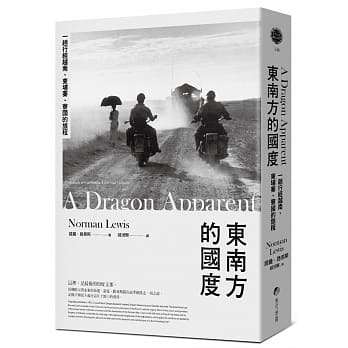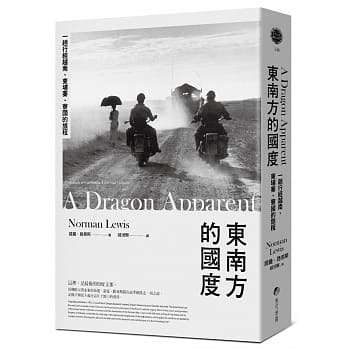Southeastern Countries: A Journey Through Vietnam, Cambodia, and Laos
Southeastern Countries: A Journey Through Vietnam, Cambodia, and Laos
In stock
Couldn't load pickup availability
出版社: 马可孛罗
ISBN/EAN: 9789578759947
出版日期: 2019-11-07
页数: 384页
语言: Traditional Chinese
Here is the last Indochina.
As if hinting at his future destiny, Norman Lewis rushed to the scene before the rainy season washed away everything.
Recording the twilight of colonialism on this land.
On world maps, Indochina is little more than a long strip of coastal land, rising at the base to form the hip of East Asia. It is purely a political entity, originally a result of French colonial rule following the conquest of the Annamite Empire and its vassal states. However, this federation is in the process of disintegration. — "Southeastern Kingdom," "Background"
In 1950, after the end of World War II, change spread rapidly across Asia. Fueled by a sense of victory and nationalism, all nations quickly launched anti-colonial movements. Unlike neighboring British India, which quickly gained independence after the war, the French were reluctant to abandon Indochina and engaged in a protracted war with the thriving resistance movement, the Viet Minh. Beyond the war in Vietnam itself, the situation in Cambodia and Laos was also unstable. Under the hail of gunfire, the lands had lost their former fertility and splendor. Amidst this situation, Norman Louis decided to explore Saigon, embarking on a turbulent and dangerous journey.
Beyond Saigon and the central Vietnam region, the lesser-known inland peninsula, along the mountainous terrain bordering present-day Cambodia and Laos, was home to ethnic minorities such as the Muong, Cham, Jarai, Ede, and Hmong. They maintained estranged relations with the Vietnamese and were often expendable during the struggle for independence. Yet, Louis was captivated by the magnificent drum and gong culture, the grand banquets, and the ancient customs. He then crossed the mountains to Angkor Wat in Cambodia to witness traditional dance performances in front of the ancient city. However, this land gradually modernized, leaving only Laos and the wildness of the mountains, carefully protected and preserved by the French.
“You should meet Vietnamese intellectuals!”
During his journey, Louis had the opportunity to chat with a young Vietnamese student, only to discover that what he had heard was largely a one-sided account from the French. It was then, at the end of his journey, through an informant, that Louis met a group of Viet Minh members. Most of them were impoverished, poorly equipped, and strictly disciplined, yet they held a strong desire for independence. With the war still raging, the future of French Indochina lay in wait, hoping that this civilization, dormant in the jungle, would once again shine.
Norman Lewis
He spent his early childhood in Enfield, North London, with his idealistic Welsh parents, and part of his childhood with his eccentric Welsh aunts. Having abandoned university due to lack of funds, he used his wedding photography and various small business ventures to fund travels to Spain, Italy, and the Balkans before being approached by the Colonial Office to help them explore Yemen through their lens.
He moved to Cuba in 1939 but was recalled to the think tank during World War II. This led to his masterpiece, Naples '44, a war diary that was not published until 1978.
Prior to that, he had published novels and travel books, notably The Southeastern Kingdom (1951) and Golden Earth (1952), both of which were bestsellers of their respective years. His novel The Volcanoes Above Us, an account of his personal experiences in Central America, sold six million paperback copies in Russia alone, while his nonfiction The Honoured Society, a study of the Sicilian Mafia, was serialized in eight issues of The New Yorker in 1964.
Lewis wrote thirteen novels and thirteen works of nonfiction, most of which were travel books, but he considered his major achievement to be the reaction to his 1968 article in The Sunday Times titled "Genocide in Brazil," which changed Brazilian law regarding Indians and formed the structure of Survival International, an influential international organization campaigning for the human rights of tribal peoples. Later, in 1988, he published a highly successful book, The Missionaries, which focused on the Indians of Central and Latin America.
Louis traveled extensively around the world until he reached the age of ninety, when he peacefully returned to his home in Essex to live with his second wife. He died in July 2003 at the age of ninety-five.
Hu Zhouxian
A graduate of the Department of Foreign Languages and Literature at National Cheng Kung University, he studied translation at the Language Studies Division of the Monterey Institute of International Studies on the Monterey Peninsula in California. Besides translating under his real name, he also writes under the pen name Qi Xuan. Living in the picturesque Taitung, he is a voracious reader, earning a living through his writings. He enjoys a leisurely lifestyle and has authored over 200 books.
His publications include The Same Moonlight and The Story of Joyful Conversations. His translations include Between Mountains and Rivers (co-translated with Huang Fangtian), The Rugged Road, Beyond Faith: Returning to the Non-Arab Islamic World, The Old Patagonia Express, The Lady and the Monk: My Year in Kyoto (all published by Marco Polo Culture), The Rainmaker, The Autobiography of Michael Jordan, M. Butterfly, Songs of a Wanderer, and Who Moved My Cheese: Youth and Children's Edition.
1982 Edition Preface Background Chapter 1 Saigon and the Vietnamese Chapter 2 Religions of the World Chapter 3 Sunday Pastimes Chapter 4 Convoy to Dalat Chapter 5 Uncharted Territory Chapter 6 Buon Ma Thuot Chapter 7 The Muong Chapter 8 Dak Lak Province Chapter 9 The Ede People Chapter 10 The Vanishing Tribes Chapter 11 Central Annam Chapter 12 Cholon and Cochinchina Chapter 13 Entering Cambodia Chapter 14 King Norodom's Capital Chapter 15 Angkor Archaeology Chapter 16 Bandit Nation Chapter 17 Laos Chapter 18 The Road to Xieng Khouang Province Chapter 19 Entering Hmong Country Chapter 20 Viet Minh About the Author
Share


